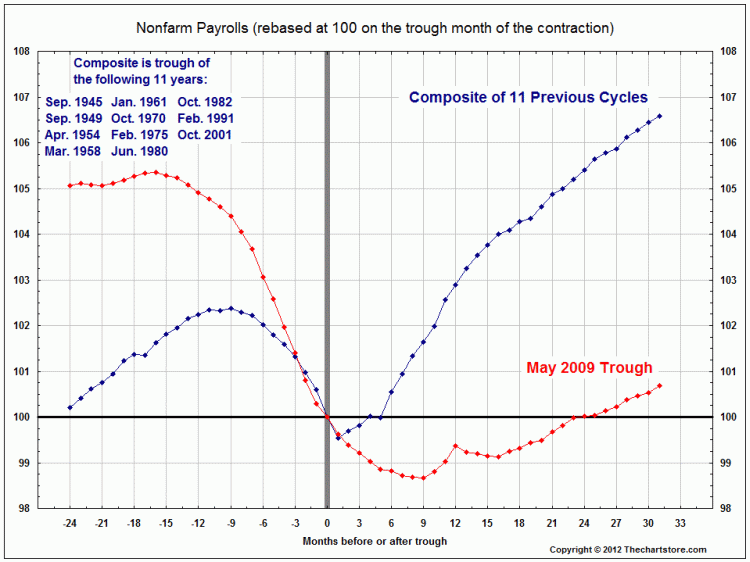(Chart courtesy of "The Big Picture " blog (Ritholtz); originally from thechartstore.com)
The chart below shows that the recovery from this Great Recession as measured in jobs is considerably slower than the composite of all periods since WWII. Why is this?
My reading and observation convinces me that we are in a period of what I'll call rapid digital productivity (RDP).
We have been through massive technological change in the past, e.g., from manual labor to steam, the Industrial Revolution, and electrification where job dislocation occurred. Employment rebounded because the average Jane and Joe could learn new skills relatively quickly and adapt to the requirements of a new work environment and different industries. Training and apprenticeships enabled most people to cope so that they became employable and could earn a decent wage in these new or expanded industries.
More recently in the 20th Century, institutions such as public education, government, private sector, and union training programs helped people learn new skills and find new jobs in basically the same economy that existed in the former 'good times.'
I believe this era in the 21st Century is different. As digital technologies, massive networks of information, quantum leaps in software capability, miniaturization, robotics and other advances in digital/computer technology (RDP) pervade more industries, the actual work available that requires humans to perform is shrinking. Businesses are finding that they can easily substitute capital investment in these RDP technologies for labor. The inputs required for the same or increased output have become far less labor intensive. That means fewer jobs while growth, albeit more slowly, occurs.
I think we are in the midst of a massive transformation that will continue to reduce the need for labor to produce the goods and services that we need to live reasonably well. Machines and systems will continue to eliminate labor as the RDP technologies are more broadly deployed. Thus, the recovery and growth in the economy to create jobs will be far slower than promised by politicians of all stripes.
Many simply do not understand the radical transformation underway. They may believe that we will return to the 'old days' when jobs came back when a recession ended. Some leaders prefer to talk about the hollowing-out of the middle class and blame the 'rich' as the problem, seeking a redistribution of wealth as a panacea. The problem is far deeper than that polarizing rhetoric and the solutions exceedingly more difficult than simply changing Presidents or members of Congress.
What has worked historically such as government stimulus and deficit spending may have a short term positive impact by pumping money into the economy. Demand for goods and services and some job growth may result, but this will not suffice for the long term because of the radical nature of the RDP technological transformation underway.
Instead, we need a basic re-thinking of the nature of work and the institutions that provide people the skills and resources to work productively in an economy that has declining need for the traditional skills of middle-class people. The inertia of our institutions far exceeds the increasing momentum of technological change.
A recent (January 2012) analysis of jobs and income in Vermont by the Public Assets Institute fails to even allude to the effects of technology (RDP) in the hollowing out of the middle class in the past decade or two, preferring to resort to political and policy reasons. This leads me to believe that many simply do not understand the deep effect that technology has had on the nature of work and middle class jobs in America.

No comments:
Post a Comment